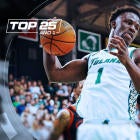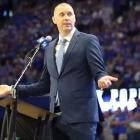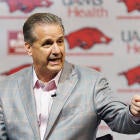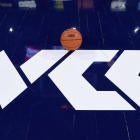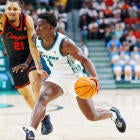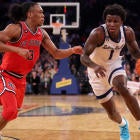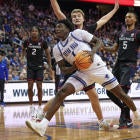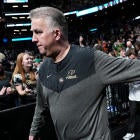CHICAGO -- Over the course of this NBA Draft season, there have been two major storylines. First, there's the race for who will go No. 1 overall, Ben Simmons or Brandon Ingram. The jury is still out on that, and this week's NBA Draft Combine will not shed any light on that as neither player is in attendance.
The second significant discussion has resolved around the new early entry process that allows potential NBA Draft prospects to return to college within 10 days of the combine ending provided they do not sign with an agent. In other words, if a player without an agent decides that he doesn't like where his stock is in terms of this draft, that person now has an out in terms of returning to school.
And overall, it's difficult to say that the new rule has not been a rousing success, particularly among the players who have received feedback.
Sure, some will tell you that coaches are left a bit in the lurch in terms of building their roster. After all, they're waiting to hear back from players who will be significant pieces on major college basketball teams next season. Simply put, those people saying they are not fans of the rule are doing so for selfish reasons, be it for their own personal pleasure in watching the amateur game or at the very least for rationales that do not have the best interests of student-athletes at heart.
At the NBA Draft Combine, there are 17 players who are still attempting to gather information on their draft stock. They range in age from the 18 year old Dedric Lawson to the 22 year old Jaron Blossomgame. In talent, they range from Ben Bentil, who is No. 38 on my board, to Marcus Lee who is all the way down at No. 111. However, to a person, underclassmen appreciate the opportunity that they have been afforded in order to gather more information and make a more well-reasoned decision.

"I think it's a great rule," Wisconsin forward Nigel Hayes, a player testing his stock, said. "It's something that should have been in place. I think it's a win-win situation for all of the parties involved. The NBA gets a chance to see future prospects and potential prospects and evaluate them earlier with a more hands on approach. The college kids get to see if they're good enough if an NBA team wants them, and if that isn't the case they can find out what they need to work on, they can go back to their college team help themselves become better and help the team become better. So I think for all of the parties involved it's a win-win."
Hayes gave basically a perfect response in terms of why a rule like this makes sense. But around the combine, players had their own reasons for wanting to test the process as opposed to just going immediately. For instance, some pointed to how close the old decision date was to the end of the NCAA postseason, and how it would have been difficult to make a call immediately following such an event. After all, last year the players only had until April 16 to pull out of the draft, just 10 days after the end of the NCAA Tournament.
"This new rule has helped me out a bunch, being able to go through all these whole new things," Syracuse freshman Malachi Richardson, the top consensus top player for NBA teams that is still testing the waters, said. "Just figuring everything out. Actually being able to go through this process, it's helping. I'm being able to figure out different things that I probably wouldn't have figured out right after the Final Four. Back then, I think I probably would have made the wrong decisions. But having this amount of time and going through the whole process, I think this decision I make will be a good one."
Others pointed to the fact of how beneficial it is just to hear the feedback they're getting coming directly from the mouths of NBA decision makers as opposed to those in the media or those around them who have a vested interest in their well-being.
"That's basically what I came out here for. To get as much feedback as possible and really sit down with NBA teams," Seton Hall guard Isaiah Whitehead said. "It's one thing for someone to tell you what they said, but it's totally different to hear it from their own voice."
Even more pointed to the fact that it will give them great experience, even if they do decide to return to the NCAA next season, either in terms of their own self-improvement or in terms of their future NBA stock.
"Even if I don't go (into the draft), if I come back next year it's now like I've been through it before," Purdue forward Caleb Swanigan said. "You have more confidence now that you've done it."
"Why not take advantage of that rule if I can have a chance to see what they think about me," Mississippi State guard Malik Newman added. "Gather all of the information of what they're giving, then if I have to, I can go back to school and correct all of those things they say so next year I can be in the NBA."
While the above players are undecided to this point, some players have already decided to declare for the draft officially and hire an agent after testing their stock. Not all of these guys are surefire first round picks, either, but in the end they decided that after beginning to go through the process that this idea was best for them.
"The little process I had as far as testing the waters came because I really didn't want to leave Maryland because Maryland is such a great place with great people and they accepted me when I transferred in from Georgia Tech," Maryland forward Robert Carter, a 5-on-5 standout on Thursday, said. "But when I decided to go ahead and get an agent, I just felt like it was time for me. I felt like my game translates really well to the NBA. I'm able to come out here, do what I love, and I felt like I could learn even more by going to the NBA. In terms of developing my career and starting my career as early as possible. So I decided to leave, choose an agent. I talked to a couple of agents, chose the one I thought was best for me, then made that decision. I prayed on it -- I'm a God-fearing person -- and I felt like it was the right decision for me."
Someone like Kay Felder had plenty of reason to stay in school. He wanted badly to play in an NCAA Tournament, and he had a shot at history this as he was within striking distance of Bobby Hurley's all-time NCAA career assist record. But in the end, he went full-steam ahead with his professional choice.
"It was just a lot of thinking," Felder said. "Coming back, being a senior, getting your degree, that definitely played into my decision when I first made it and was thinking about testing the waters. But once I really sat down and thought about how to approach this, I sat down and hired an agent because now is the right time for me to make the jump. It's not everyday someone from my neighborhood, from my family, gets to experience this."
Truly, it's a difficult decision, so you can understand why giving these kids more time to make a call is vital. Even a higher end player like Wade Baldwin -- currently a top-20 prospect for most people around the league -- wasn't entirely sure until he spoke with his coach, who told him to go.
"I actually sat down in Coach (Kevin) Stallings' office," Baldwin said. "I asked him 'If you were me, what would you do?' And you know, this is coming from a college coach who can selfishly say 'I want you back next year. You know, we're losing Damian. We want you back to improve our team.' But instead, he told me, 'Honestly, Wade, I think you should go. I think you're ready to go.' So right there, it was kind of like, I have a chance to be an NBA player and I'm going to go full-tilt with it."
It makes sense that underclassmen were universal in their acclaim, given how close they are to the situation and just generally due to a slightly lower level of maturity that comes with age. Seniors were a bit more mixed on the idea of testing the waters after not getting a chance to do it over the course of their four years. Still though, some admitted they likely would have gone through the process had the option existed for them back when they were underclassmen.
"I definitely would have after my sophomore year," North Carolina guard Marcus Paige said. "It might not be great for college coaches because it gives them all of the uncertainty, but it's awesome for the players. Anytime you get feedback in terms of making a smart decision, I don't know why you wouldn't take advantage of that."
"I feel like it's something I would have tried just to get a feel," Kansas forward Perry Ellis added. "Maybe I wouldn't come out and get an agent or anything, but just to kinda get a feel for what it'd be like for when I do make that step, I'd be good to go. Learn what it's like. Learn what these teams are wanting. Going through interviews. It's beneficial for them."
The players that were a bit more hesitant didn't necessarily have a problem with the rule itself. Rather, they simply questioned as to whether or not they would have taken advantage of it for varying reasons, either team or academically related.
"The rule in general is a good rule, to be honest," Baylor forward Taurean Prince said. "It gives a lot of kids with a lot of dreams hope. Them going out and testing the waters and getting some good information back on what they need to do and what they do good, I think it's a good rule. Having said that though, I would have stayed regardless because I wanted my degree."
"You know, testing the waters, for me, I don't know if that would have been beneficial," Iowa State forward Georges Niang added when asked if he would have considered it. "I'm a big team guy. I'm all about the team, and if my team knew I was going out and doing things for my personal benefit and not being back on campus and getting better with them. I don't know how that would affect them and I wouldn't want that to jeopardize my relationship with my team. Because, if I were to go back, I'd want to be able to be focused on winning and be all in on that. It's a tough decision people have to make, and you have to put your own personal benefit ahead of other things. But I don't know that I could personally do that because my team means so much to me."
You see, it's not lost on the players that the rule puts their coaches in a bit of a bind. Virginia guard Malcolm Brogdon, particularly, questioned to me how coaches would react to a player being unsure if he'd want to return, simply in terms of buy in and full investment in the program. They're sympathetic to the cause, largely, and want success for the college programs regardless of them being on the team or not. However, when weighing those factors against each other, Paige put it best in terms of how the general feeling around college is at this point.
"It's hard because you want to be fair to everybody involved, but the best thing to do is to help the players because they're the ones who are making the decision and once you decide, you can't go back," Paige said. "So I think this is good for the game."
Indeed, if we're focused on the welfare of student athletes at this stage, it seems clear that this is something that should not just be a one-hit wonder in the NCAA or in the NBA.
Allowing kids to test the NBA Draft waters should be here to stay, given -- as Nigel Hayes said above -- the win-win nature of its proposition.














